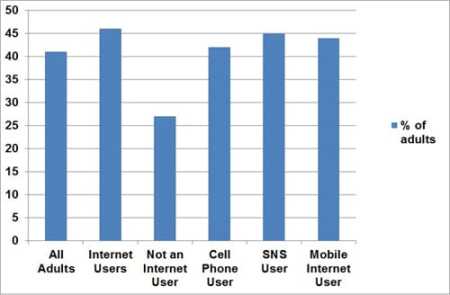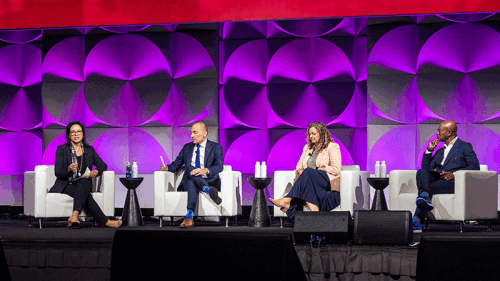Rebecca Devine in a video
where she talks about the industry’s initial fear about engaging the community and how opening the communication avenues will help get a projected developed.
Seven years ago, Rebecca Devine left the largest communications agency in the Mid-Atlantic region to found Maven Communications. She utilized her expertise in political, corporate, nonprofit, and crisis communications to build a successful public relations firm that develops communications strategies for numerous residential and commercial real estate (CRE) companies.
In a recent conversation with Urban Land’s Robert Krueger, Devine addresses questions of how the CRE industry can use tangible data to maximize its return on investment. Herein she offers concrete tactics for how CRE firms can boost their online social influence, examples of companies that have had success with new media, as well as her thoughts about the future of social media within the industry
UL: How can CRE companies benefit from social media?
Devine: In today’s competitive environment, it’s more important than ever for CRE companies to leverage tools that help boost visibility, foster relationships, and build brand equity for their properties, themselves, and their employees. Social media can help by enabling clients, tenants, and community members to find you and your company more easily. The most obvious way CRE companies can use social media is for property promotion, but there are other ways to build these relationships.
For example, social media can be an effective forum [in which] to showcase your firm’s thought leadership by sharing industry commentary, speeches, and white papers via blogs, video, etc. It can also be an invaluable market research and customer satisfaction tool. Tools like Google Alerts and TweetDeck allow you to easily monitor how your company, your competitors, keywords, and phrases are turning up in blogs and other online conversations. Monitoring brand chatter is invaluable for corporate managers and property owners, who can use this information to spot issues and respond to complaints faster and more directly than ever before. This interaction facilitates referrals and builds goodwill, which, in turn, may result in higher retention rates, more direct sales contact, and new leads. On the urban planning side, social media can help spur grass-roots support (or, in some cases, opposition) for new development projects by connecting project advocates via Twitter and Facebook.
UL: How do you measure social media’s return on investment (ROI) for CRE?
Devine: ROI with social media means something different for each company or individual. To effectively measure ROI, you need to set measurable objectives at the outset of your campaign. Keep in mind that these objectives aren’t always about direct sales, but rather indirect brand benefits. [With few exceptions, you are not going to sell a retail space or close a deal on Facebook alone]. For example, if your goal is to enhance your professional network, then measuring direct referrals, calls, or meetings may make sense. If you are using social media as a customer service tool, then a reduction in the number of complaints and/or improved ratings on online reviewer sites are more appropriate. Other, “softer” returns—such as number of newsletter subscriptions, increase in web traffic to your blog or website, or comments to articles and posts—should also be factored into your calculation.
Another key consideration in ROI is time. The most common misconception about social media is that it is free. It is not. Your time, effort, and upkeep are important factors to consider on a weekly, a monthly, or an annual basis.
The Relationship Between Technology Use and Trust
Is online social media engagement worth the effort? When using regression analysis to control for demographic factors, results showed that this percentage is more than double the percentage of others. Addtionally, 45% of social networking service (SNS) users are willing to trust others. Specifically, Facebook users who use the site multiple times per day are 43% more likely to trust other people than other internet users. Source: Pew Research Center’s Internet & American Life Social Network Site survey conducted between October 20 - November 28, 2010. |
UL: Who should be running a company’s social media presence? PR team? Marketing team? IT team? Interns? Or a combined effort?
Devine: Many companies hand over the keys to the kingdom to interns, since they are often younger and more familiar with using social media. However, inexperienced staff members may not recognize inappropriate content before blasting it out to thousands of people. Assign ownership of your company’s social media initiatives to employees who you trust to be the gatekeepers of your brand. This role traditionally falls to someone in the PR or marketing department, but it doesn’t necessarily have to. Consumer companies like Dell and IBM rely on a mix of thought leaders on their social media sites, ranging from the CEO Michael Dell to software engineers, marketing folks, and customer service reps. The important thing is that your team be passionate about your company and committed to social media efforts. Regardless of who bears ultimate responsibility, make sure there is an approval process for reviewing posts about the company or industry before they are sent.
UL: With the rise of social media networking sites [e.g., Facebook, LinkedIn] over the past several years, is it still beneficial for a CRE company to have an active blog?
Devine: Personally, I think active blogs can be an invaluable tool for companies that choose to invest in them. A regularly updated, thoughtful blog enables companies to showcase their thought leaders, promote company news, educate clients, and put a human face on their brand in a format that is cheap and easy to use. When integrated into your firm’s website, blogs also help boost search engine optimization (SEO) and drive traffic to your site or other social media outlets. Unlike media coverage or even other social media platforms, blogs present an opportunity to publish and syndicate your news and views without any character limits, filters, external editors, or reporter bias. Of course, it isn’t enough to simply start a blog. To be successful, you also have to populate it with regularly updated and relevant content.
UL: Should companies have a presence on many social media platforms or just a few?
Devine: The number of social media platforms you pursue should depend on your resources and individual target audiences. If you are targeting 18- to 22-year-olds for a student housing project, then having a Facebook and YouTube presence makes a lot of sense, but LinkedIn may not. Just because the platform exists doesn’t mean you need to be there. Think about where your audiences look for information, and spend your time making those communities really valuable.
UL: What is the best land use or CRE social media campaign that you have seen?
Devine: Simon Properties does a terrific job of making social media relevant and engaging for consumers, by pushing a mix of events, deals, and lifestyle information to its followers. Each of [the company’s] properties has Facebook and Twitter pages, some with 70,000 followers or more. The admin [staff] responds quickly to consumer posts, whether they are asking a question, logging a complaint, or just sharing their shopping experience.
The Bozzutto Group was also an early adopter of social media, and has been using it to effectively build its tenant communities, broaden its reach, protect its brand, and increase referrals.
UL: How do you know if all of your tweeting, blogging, video uploads, and Facebooking is making a difference? What tools can you use to measure whether you are making a difference and then how do you use those data?
Devine: This is such an important question, and it ties back to setting measurable objectives. Knowing what you want to measure before you engage in a social media campaign sounds basic, but most companies just dive in without a plan of action. Companies need to ask themselves, “What is it we want to improve, change, communicate, advocate, or sell?” From there, you can set specific [measurable] goals for metrics like sales, referrals, awareness, traffic [website traffic, Facebook traffic, etc.], decrease in customer complaints, increase in positive reviews, etc.
For example, if your goal is to reduce the number of complaint calls from residents, your strategy might be to create Facebook and Twitter accounts designed specifically to handle resident issues. After communicating the new option to residents, track the number of calls your office receives, along with the number of residents who use the new online services. If the campaign was effective, then you should see an increase in the number of Facebook and Twitter messages, and a decrease in [the number of] complaint calls to the office.
There are a number of free social media measurement tools available today. Some of my favorites are:
- Insights: Facebook and YouTube both have built-in measurement tools [called Insights] that can help you track the number of views, fans, friends, downloads, etc., to see what content resonates online.
- Google Analytics is a free web traffic and analytics tool that can be easily embedded in your website or Facebook page.
- Twitalyzer is a free analytics dashboard for Twitter that provides detailed metrics on things like impact, engagement, clout, and velocity for individual Twitter accounts.
- Socialmention is a social media search and analysis platform that aggregates user-generated content from across the web into a single stream of information. You can set up alerts, too, and have them automatically sent to your inbox.
- Hootsuite is an invaluable social media management tool that enables you to manage multiple social media accounts, including Twitter, LinkedIn, and Facebook, from one platform [no signing in or signing out required].
UL: What’s next? What is the future of social media in the industry?
Devine: Mobile adoption will probably be the biggest factor for CRE companies. By the end of 2011, more than half the U.S. population will have a smartphone. Globally, mobile internet is projected to overtake desktop internet use by 2014. That means consumers, tenants, renters, and project supporters and investors will expect to interact with CRE companies directly from their mobile device. Making your site mobile-enabled, while adding easily shared and viewed content like video, will give CRE companies a leg up on their competitors.
UL: Do you anticipate Google+ changing social media?
Devine: Google+ is still a fledging platform, but it has some serious built-in advantages over other social networks: it has a host of products and its own mobile operating system, making it easy to integrate into people’s lives. As part of the largest search engine in the world, Google+ also has the potential to highly influence rankings and recommended content. +1, the Google+ equivalent of Facebook’s “Like” button, has already started showing up on websites and content rankings across the web. Interest has also been unparalleled. Since launching in July, the site has already attracted more than 25 million users, with 16 million more reporting they will sign on by the end of year. This is a tremendous feat when you consider the social media site itself is beta and invite only.
Currently, Google+ does not allow business entity accounts, but that functionality will roll out by the end of the year. If interest and adoption keep the same pace, then Google+ could become an invaluable social media tool for CRE marketers.
Over the course of her career, Devine has aided the launch of venture startups, helped CEOs position themselves as industry thought leaders, and provided crisis communications advice to the Dixie Chicks. In addition, she is a regular speaker at Urban Land Institute events on the topics of strategic communications and social media.


